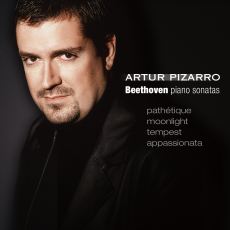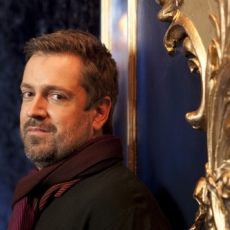Beethoven Piano Sonatas - Pizarro - Gramophone
Previously heard largely in off-beat repertoire for Collins and Hyperion, Artur Pizarro now re-emerges on Linn Records with performances of Beethoven sonatas sufficiently individual and freshly conceived to make them emerge as new-minted rather than over familiar. Let no-one say that there is no room for another set of established masterpieces when the pianist is possessed of this sort of recreative energy and exuberance!
The contrast between Beethoven's opening Grave and Allegro di molto e con brio in the Pathétique Sonata is vividly and romantically caught; and if the weight at climactic points is punishing, the impetus and momentum are unflagging (two by no means inseparable considerations). Everything is experienced anew: Pizarro presents the central Adagio as an uneasy truce between two outer storms (even the finale is fast and urgent; no tame of wistful Allegretto anticlimax for him!); and in the opening of the Moonlight Sonata his free-flowing Andante in an entirely valid alternative to say, the eternally pensive Adagio of Solomon fame. Never one to accentuate melody at the expense of harmony, he balances sense and sensibility to an ideal degree, and if his freedom in the Trio of the Allegretto causes a few raised eyebrows it is not, again, without its own startling and refreshing insight. The fires of both this and the other Sonatas are raised to fever pitch, conveyed with an unfaltering assurance and sheer musical character.
Even the finale of the so-called Tempest Sonata (what was Beethoven thinking of; what possible connection has this music with a play essentially about rebirth and regeneration?) is propelled at an Allegro-Presto tempo rather than Allegretto. Pizarro is not frightened to go his own way, and I think that his way of allowing such pages to erupt in a blaze of romantic fire would have won Beethoven's hearty applause and approval.
He casts a romantic haze across the problematic first movement recitatives in the same sonata yet still maintains clarity (no mistaking Beethoven for Debussy here); and even when you find him softening some of Beethoven's sf blows, his always susceptible playing makes you welcome a still young pianist anxious, but never over-anxious, to underline Beethoven's pioneering and burgeoning spirit as he forges ahead into ever new, uncharted territory.
Linn's recording, of an uncommonly warm-toned Blüthner, is exceptional. I hope this is the start of what promises to be a more than distinguished series.

